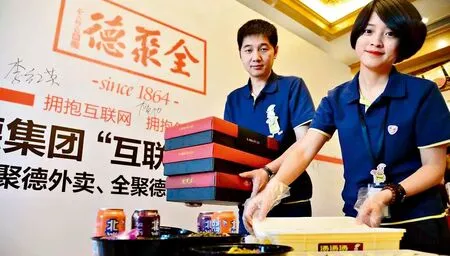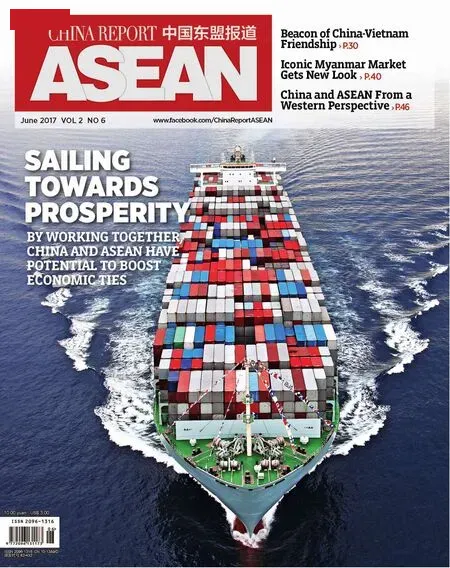Time-honored Brands in Transition
By Wang Jiping
Time-honored Brands in Transition
By Wang Jiping
China's centuries-old traditional brands see gradual return to growth after being caught off guard by e-commerce
In China, there are a number of brands that have stood the test of time and are widely recognized by the public. Many such brands have been in existence for centuries, including Wuyutai Tea, one of Beijing's most famous teashop chains, and Heng Yuan Xiang, a leading company in China’s wool industry. Such brands have long been synonymous with high-quality and trustworthy products.
In recent years, however, as market competition has intensified and consumer behavior has evolved, growth among such famous companies has slowed, and some have even entered a period of decline. As of 2017, only about 30 percent of Ministry of Commerce (MOC) designated China Time-honored Brands, which number around 2,000, have managed to maintain normal operation.
In order to improve performance, many timehonored brands have focused on innovation, seeking to implement various online aspects into their businesses. They have made great efforts to integrate online and offline marketing and innovate their management models, aiming to meet the needs of consumers in a modern society, especially growing numbers of young and middle-aged consumers.
A New Orientation
“This indicates a new orientation for branding,” said Ma Qiji, a research fellow at the Peking University School of New Media. “Hundreds of time-honored brands are classic symbols of Chinese entrepreneurial spirit and cultural tradition. Over the past few hundred years, their products and services have demonstrated brilliance in quality, ingenuity and craftsmanship. As technology develops, culture evolves and people’s minds change, these traditional businesses have to adapt to survive. With e-commerce and allround digital business strategies, along with‘new retail’ as the route and innovation as the means, many old brands have regained confidence in their businesses through innovative practices.”
The Ali Research Institute, a think tank platform under the umbrella of Chinese e-commerce giant Alibaba Group, recently released a report on the Top 100 E-commerce Platforms of China Timehonored Brands 2016. The report conducted an evaluation of online sales of MOC-designated Time-honored Brands products on Alibaba retail platforms between 2014 and 2016.
In terms of industries they are engaged in, brands on the list range widely,from food, beverage, alcohol and tea to daily chemicals, apparel, Chinese medicine and even musical instruments.
In terms of geographical distribution, timehonored brands are plentiful in eastern China and scarce in western China. There are 82 brands on the list based on China's east coast, while only 18 are found in the central and western regions of China.
Promising Platform
Against the background of the internet economy, succeeding under a new economic development model and realizing upgrading and transformation not only concern the survival of time-honored brands, but are also of great importance to all traditional industries and government authorities.


On April 12, 2016, Quanjude Group, a Beijing roast duck restaurant chain, announced its“internet plus”strategy and launched its online takeout service in Beijing.
Heng Yuan Xiang, for example, was established in 1927 and has grown from a small woolen cloth shop into one of the world's largest consumers of wool. It uses more than 10,000 tons of wool every year, which means the wool of one in every 10 sheep around the world is processed by Heng Yuan Xiang. In 2011, the company set up an independent e-commerce branch as part of its all-round marketing strategy, which led to positive results. Sales on its Alibaba retail platform exceeded 2 billion yuan (US$290 million) in 2016. Over the past three years, its e-commerce platform saw annual growth rates of 141 percent, 63 percent and 43 percent, respectively, much higher than the industry average.
It is noteworthy that the first 10 brands on the Top 100 list achieved an average growth rate up to 64 percent last year, showing that fast growth has become crucial in an era of intensified competition. According to the Ali Research Institute, overall sales of the top 100 brands realized a growth rate of more than 50 percent for two consecutive years on a yearon-year basis. Even the lowest annual sales on the list tripled over the course of the last three years, nearing 10 million yuan (US$1.46 million) in 2016.
Growing Consumption, Supply-side Reform
According to China's National Bureau of Statistics, final consumption accounted for 64.6 percent to China’s GDP in 2016 — 4.7 percentage points higher than 2015. This indicates that consumption has become most dynamic among the “three horses” (investment, export and consumption) driving China’s economic growth. For timehonored brands mainly engaged in retail, it is indeed a piece of good news. Catalyzed by the internet economy, these brands see new opportunities in the rise of consumption.
Embrace of the internet also echoes supply-side structural reform of China. In the context of rising consumption, demand for high-quality products and services is set to increase. At the same time, time-honored brands have long been synonymous with high quality products and services. Though the past few years have seen them lose their competitive edge due to poor performance in marketing and branding, online platforms can help them enhance their connection with customers and rebuild their fame by channeling supply and consumption needs.
As more than 30 percent of Chinese time-honored brands have opened online stores on Alibaba platforms Tmall and Taobao, embracing e-commerce has become an industry trend. Most of the top 100 brands on the list have a flagship store on Tmall.
Meanwhile, local governments have also played an active role in encouraging traditional businesses to improve branding via the internet. Driven by huge customer demand for online retail, an increasing number of old and famous brands are expected to flock to third-party e-commerce platforms, benefiting from the joint efforts of the companies, government authorities and e-commerce platforms.

